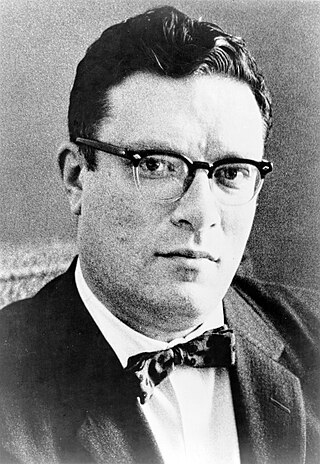
Isaac Asimov was an American writer and professor of biochemistry at Boston University. During his lifetime, Asimov was considered one of the "Big Three" science fiction writers, along with Robert A. Heinlein and Arthur C. Clarke. A prolific writer, he wrote or edited more than 500 books. He also wrote an estimated 90,000 letters and postcards. Best known for his hard science fiction, Asimov also wrote mysteries and fantasy, as well as popular science and other non-fiction.
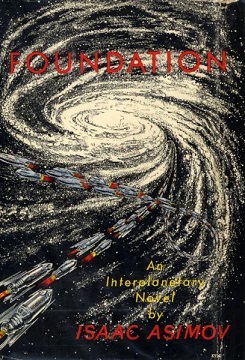
The Foundation series is a science fiction book series written by American author Isaac Asimov. First published as a series of short stories and novellas in 1942–50, and subsequently in three collections in 1951–53, for nearly thirty years the series was a trilogy: Foundation (1951); Foundation and Empire (1952); and Second Foundation (1953). It won the one-time Hugo Award for "Best All-Time Series" in 1966. Asimov later added new volumes, with two sequels: Foundation's Edge (1982) and Foundation and Earth (1986), and two prequels: Prelude to Foundation (1988) and Forward the Foundation (1993).
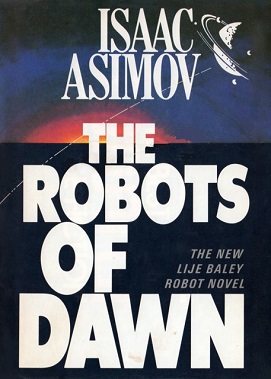
The Robot Series is a series of thirty-seven science fiction short stories and six novels created by American writer Isaac Asimov, published from 1940 to 1995. The series is set in a world where sentient positronic robots serve a number of purposes in society. To ensure their loyalty, the Three Laws of Robotics are programmed into these robots, with the intent of preventing them from ever becoming a danger to humanity. Later, Asimov would merge the Robot series with his Foundation series.
The Galactic Empire series is a science fiction sequence of three of Isaac Asimov's earliest novels, and extended by one short story. They are connected by their early place in his published works and chronological placement within his overarching Foundation universe, set around the rise of Asimov's Galactic Empire, between the Robot and Foundation series to which they were linked in Asimov's later novels.
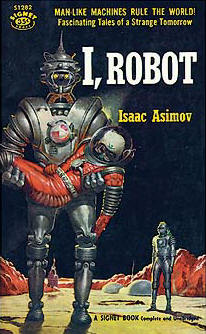
The Three Laws of Robotics are a set of rules devised by science fiction author Isaac Asimov, which were to be followed by robots in several of his stories. The rules were introduced in his 1942 short story "Runaround", although similar restrictions had been implied in earlier stories.

Hari Seldon is a fictional character in the Foundation series of novels by Isaac Asimov. In his capacity as mathematics professor at Streeling University on the planet Trantor, Seldon develops psychohistory, an algorithmic science that allows him to predict the future in probabilistic terms. On the basis of his psychohistory he is able to predict the eventual fall of the Galactic Empire and to develop a means to shorten the millennia of chaos to follow.

Roger MacBride Allen is an American science fiction author. He was born in Bridgeport, Connecticut and grew up outside of Washington, D.C., graduating from Walt Whitman High School. He graduated from Boston University in 1979. His father is American historian and author Thomas B. Allen.
Caliban is a character in William Shakespeare's play The Tempest.

Foundation is a science fiction novel by American writer Isaac Asimov. It is the first published in his Foundation Trilogy. Foundation is a cycle of five interrelated short stories, first published as a single book by Gnome Press in 1951. Collectively they tell the early story of the Foundation, an institute founded by psychohistorian Hari Seldon to preserve the best of galactic civilization after the collapse of the Galactic Empire.

Foundation's Triumph (1999) is a science fiction novel by American writer David Brin, set in Isaac Asimov's Foundation universe. It is the third book of the Second Foundation trilogy, which was written after Asimov's death by three authors, authorized by the Asimov estate. Brin synthesizes dozens of Foundation-Empire-Robots novels and short stories by Isaac Asimov, Roger MacBride Allen, and authorized others into a consistent framework. Foundation's Triumph includes an appendix chronology compiled by Attila Torkos.
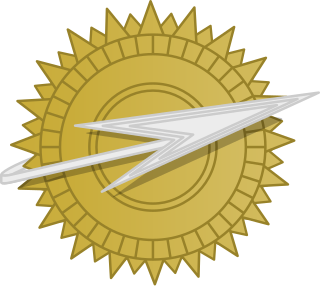
The Galactic Empire is an interstellar empire featured in Isaac Asimov's Robot, Galactic Empire, and Foundation series. The Empire is spread across the Milky Way galaxy and consists of almost 25 million planets settled exclusively by humans. For over 12 millennia the seat of imperial authority was located on the ecumenopolis of Trantor, whose population exceeded 40 billion, until it was sacked in the year 12,328. The official symbol of the empire is the Spaceship-and-Sun. Cleon II was the last Emperor to hold significant authority. The fall of the empire, modelled on the fall of the Roman Empire, is the subject of many of Asimov's novels.
This is a bibliography of the books written or edited by Isaac Asimov, arranged alphabetically. Asimov was a prolific author, and he engaged in many collaborations with other authors. This list may not yet be complete. The total number of books listed here is over 500. Asimov died in 1992 at age 72; a small number of his books were published posthumously.
This is a list of short stories by American writer Isaac Asimov. Asimov is principally known for his science fiction, but he also wrote mystery and fantasy stories.

Lucky Starr is the hero of a series of science fiction books by Isaac Asimov, using the pen name "Paul French" and intended for children.
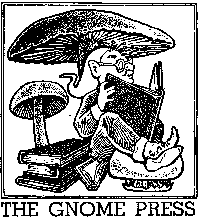
Gnome Press was an American small-press publishing company primarily known for publishing many science fiction classics. Gnome was one of the most eminent of the fan publishers of SF, producing 86 titles in its lifespan — many considered classic works of SF and Fantasy today. Gnome was important in the transitional period between Genre SF as a magazine phenomenon and its arrival in mass-market book publishing, but proved too underfunded to make the leap from fan-based publishing to the professional level. The company existed for just over a decade, ultimately failing due to inability to compete with major publishers who also started to publish science fiction. In its heyday, Gnome published many of the major SF authors, and in some cases, as with Robert E. Howard's Conan series and Isaac Asimov's Foundation series, was responsible for the manner in which their stories were collected into book form.
The Foundation universe is the future history of humanity's colonization of the galaxy, spanning nearly 25,000 years, created through the gradual fusion of the Robot, Galactic Empire, and Foundation book series written by American author Isaac Asimov.
In a writing career spanning 53 years (1939–1992), science fiction and popular science author Isaac Asimov (1920–1992) wrote and published 40 novels, 383 short stories, over 280 non-fiction books, and edited about 147 others.
Depending on the counting convention used, and including all titles, charts, and edited collections, there may be currently over 500 books in Isaac Asimov's bibliography—as well as his individual short stories, individual essays, and criticism. For his 100th, 200th, and 300th books, Asimov published Opus 100 (1969), Opus 200 (1979), and Opus 300 (1984), celebrating his writing.









